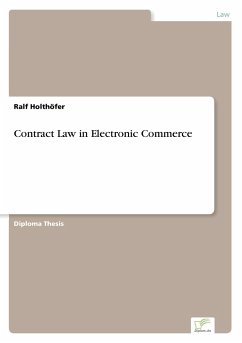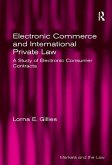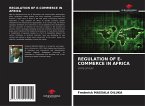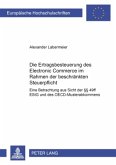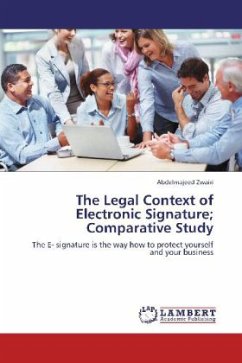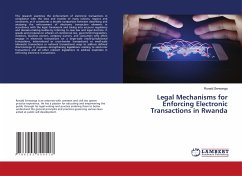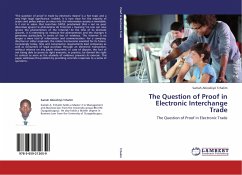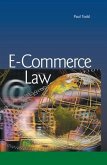Diploma Thesis from the year 2000 in the subject Law - Civil / Private / Trade / Anti Trust Law / Business Law, grade: 1,0, Technical University of Darmstadt (Rechts- und Wirtschaftswissenschaften), language: English, abstract: Inhaltsangabe:Abstract:
This paper was written during my studies at Georgia State University, Atlanta in Fall 2000 in the context of an exchange program between Georgia State University and Technische Universität Darmstadt. Its subject is the new contract law in electronic commerce.
The paper starts with an illustration of the situation of legal uncertainty prior to the establishment of a specific contract law in electronic commerce. Many laws governing contract formation were drafted before the existence of electronic messaging and did not adequately address the challenges of electronic transactions. Furthermore, electronic transactions were often hindered by the diversity of state laws. This situation was considered to place some severe legal obstacles to the development of electronic commerce.
In 1997, President Clinton and Vice President Gore unveiled their Framework for Global Electronic Commerce. This issue defined the main goals for the future development of both domestic and global electronic commerce. The general objective was to establish a Uniform Commercial Code for this ascending sector of commerce in order to facilitate and enforce electronic transactions.
The legislative efforts to achieve those goals recently resulted in two uniform acts, the Uniform Computer Information Transactions Act (UCITA) and the Uniform Electronic Transactions Act (UETA), and the federal Electronic Signatures in Global and National Commerce Act (E-sign Act).
The paper deals with these new legislative approaches. Aside from the presentation of the scopes of the different acts the paper focuses on their fundamental principles and major provisions. Furthermore, it discusses the new enactments in the context of a selection of fundamental legal issues raised by electronic commerce.
This discussion finally shows that, although there have been a number of serious endeavors to achieve the above mentioned goals by drafting several electronic commerce statutes, the recent enactments relating to contract law in electronic commerce are not able to achieve the goals set out in the Framework for Global Electronic Commerce. There still remain significant legal obstacles that prohibit electronic commerce from reaching its full potential.
Zusammenfassung:
Diese Arbeit wurde während meines Studienaufenthaltes an der Georgia State University, Atlanta im Herbstsemester 2000 im Rahmen eines Austauschprogramms zwischen der Georgia State University und der Technischen Universität Darmstadt geschrieben. Das Thema der Arbeit ist das neue Vertragsrecht in Electronic Commerce Transaktionen.
Die Arbeit beginnt mit einer Schilderung der durch Rechtsunsicherheit geprägten Situation vor dem Vorhandensein eines speziellenE-commerce Vertragsrechtes. Viele Gesetze, die Vertragsangelegenheiten regelten, waren vor dem Beginn des elektronischen Zeitalters erstellt worden und waren aus diesem Grund den Anforderungen des elektronischen Geschäftsverkehrs nicht gewachsen. Des weiteren existierte eine Vielzahl an kontroversen Staatsgesetzen, die das Abschließen elektronischer Verträge zwischen Parteien aus unterschiedlichen Staaten problematisch machte. Diese Situation stellte ein Hindernis für die Entwicklung des Electronic Commerce dar.
Im Jahre 1997 veröffentlichten Präsident Clinton und Vizepräsident Gore ihr Framework for Global Electronic Commerce . In diesem Dokument wurden die Hauptziele für die Entwicklung des nationalen und internationalen Electronic Commerce definiert. Die Grundidee sah die Erstellung eines Uniform Commercial Code für den elektronischen Geschäftsverkehr vor, der elektronische Transaktionen vereinfachen und die Gültigkeit von ...
This paper was written during my studies at Georgia State University, Atlanta in Fall 2000 in the context of an exchange program between Georgia State University and Technische Universität Darmstadt. Its subject is the new contract law in electronic commerce.
The paper starts with an illustration of the situation of legal uncertainty prior to the establishment of a specific contract law in electronic commerce. Many laws governing contract formation were drafted before the existence of electronic messaging and did not adequately address the challenges of electronic transactions. Furthermore, electronic transactions were often hindered by the diversity of state laws. This situation was considered to place some severe legal obstacles to the development of electronic commerce.
In 1997, President Clinton and Vice President Gore unveiled their Framework for Global Electronic Commerce. This issue defined the main goals for the future development of both domestic and global electronic commerce. The general objective was to establish a Uniform Commercial Code for this ascending sector of commerce in order to facilitate and enforce electronic transactions.
The legislative efforts to achieve those goals recently resulted in two uniform acts, the Uniform Computer Information Transactions Act (UCITA) and the Uniform Electronic Transactions Act (UETA), and the federal Electronic Signatures in Global and National Commerce Act (E-sign Act).
The paper deals with these new legislative approaches. Aside from the presentation of the scopes of the different acts the paper focuses on their fundamental principles and major provisions. Furthermore, it discusses the new enactments in the context of a selection of fundamental legal issues raised by electronic commerce.
This discussion finally shows that, although there have been a number of serious endeavors to achieve the above mentioned goals by drafting several electronic commerce statutes, the recent enactments relating to contract law in electronic commerce are not able to achieve the goals set out in the Framework for Global Electronic Commerce. There still remain significant legal obstacles that prohibit electronic commerce from reaching its full potential.
Zusammenfassung:
Diese Arbeit wurde während meines Studienaufenthaltes an der Georgia State University, Atlanta im Herbstsemester 2000 im Rahmen eines Austauschprogramms zwischen der Georgia State University und der Technischen Universität Darmstadt geschrieben. Das Thema der Arbeit ist das neue Vertragsrecht in Electronic Commerce Transaktionen.
Die Arbeit beginnt mit einer Schilderung der durch Rechtsunsicherheit geprägten Situation vor dem Vorhandensein eines speziellenE-commerce Vertragsrechtes. Viele Gesetze, die Vertragsangelegenheiten regelten, waren vor dem Beginn des elektronischen Zeitalters erstellt worden und waren aus diesem Grund den Anforderungen des elektronischen Geschäftsverkehrs nicht gewachsen. Des weiteren existierte eine Vielzahl an kontroversen Staatsgesetzen, die das Abschließen elektronischer Verträge zwischen Parteien aus unterschiedlichen Staaten problematisch machte. Diese Situation stellte ein Hindernis für die Entwicklung des Electronic Commerce dar.
Im Jahre 1997 veröffentlichten Präsident Clinton und Vizepräsident Gore ihr Framework for Global Electronic Commerce . In diesem Dokument wurden die Hauptziele für die Entwicklung des nationalen und internationalen Electronic Commerce definiert. Die Grundidee sah die Erstellung eines Uniform Commercial Code für den elektronischen Geschäftsverkehr vor, der elektronische Transaktionen vereinfachen und die Gültigkeit von ...

